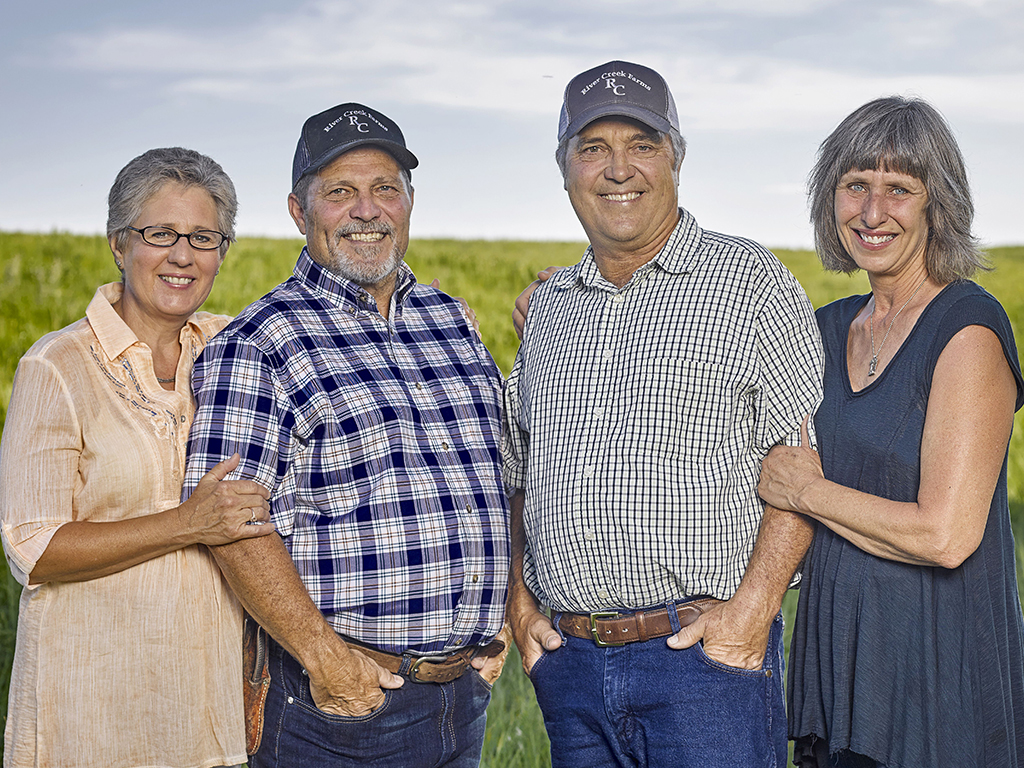
River Creek Farm near Zeandale, Kansas is owned by the Mertz family. (L to R) Mary and Bob Mertz, Joe and Kim Mertz | Download this photo.
Kansas Profile – Now That’s Rural: River Creek Farms, Mertz family – Part 2
July 11, 2018
The U.S. Secretary of Agriculture and two U.S. senators enter the room. That sounds like a description of a Washington, D.C. hearing room, but in this case, it refers to what happened recently in the stone barn of a leading farm family in rural Kansas.
Last week we learned about longtime agricultural leaders Jeanne and Harold Mertz of River Creek Farms near Manhattan. Today, River Creek Farms is owned by two of their sons, Joe and Bob, and their wives Kim and Mary, respectively. The Mertz farm recently hosted the U.S. Secretary of Agriculture for a meeting with Kansas farm leaders.
As the name River Creek Farm suggests, their farm ground is situated near a river. That means it is good fertile bottomland with water nearby, but it also can be risky during flooding. During the 1951 flood, floodwaters devastated downtown Manhattan and struck the Mertz farm and others. Jeanne and her one-month-old baby son Joe were evacuated from the farm by boat.
After the floodwaters receded, the Mertzes returned to the farm. They built a diversified crop and livestock operation, situated between the rural communities of Zeandale and Wabaunsee, population 517 people. Now, that’s rural.
Harold and Jeanne raised five children: Joe, Tom, Bob, Jon, and sister Jane. Tom is CEO and owner of a company in Gardner. Jon works at the Flint Hills Discovery Center in Manhattan, and Jane Mertz Garcia is a faculty member at K-State.
Joe came back to the farm after graduating from K-State in agriculture and serving on the livestock judging team. His judging experience and studies in the animal sciences department at K-State led him to suggest to his father that they try something new: He suggested that he would artificially inseminate their Polled Hereford cows with semen from Simmental bulls. His parents agreed and the resulting hybrid vigor was excellent.
Meanwhile, Joe met and married Kim Newell. His parents moved to a neighboring house, so Joe and Kim began their married life in the same house that Joe’s father and grandfather had begun their married lives. Joe and Kim went on to raise four kids on the farm: Asher, Lincoln, Malia and Abram.
In 1985, the Mertzs began offering purebred Simmental bulls for sale by private treaty. They later branched into Simmental-Angus cross bulls and offer a bull sale annually.
Joe’s younger brother Bob also went to K-State and competed on the livestock judging team. After graduation, Bob went to work for the National Livestock and Meat Board in Chicago for six years. Here he met a young lady named Mary. They married and also returned to the farm. Bob and Mary had two children, Lisa and David. Harold and Jeanne were proud that all six of their grandchildren got undergrad and/or post-graduate degrees from K-State.
Today, Joe manages the livestock while Bob has responsibility for the crops. River Creek Farms includes 3,600 acres of crop production which Bob has advanced technologically and sustainably. The Mertzs also have what has been described as one of the premier Simmental and SimAngus herds in the country. As the farm website says: “Our guiding principles throughout have remained the same: calving ease and disposition, a sincere focus on end-product value and harnessing the benefits of hybrid vigor. These cornerstones remain in place to this day and characterize every bull we sell, even if much has changed over the past 125 years.”
In 2018, Senator Pat Roberts, the chairman of the U.S. Senate Agriculture Committee, was looking for a farm to host the U.S. Secretary of Agriculture for a meeting with Kansas farm leaders. The location they chose was River Creek Farms, owned by the Mertz family.
It’s time to leave this meeting of the USDA Secretary and the senators, held on a family farm in a rural valley near Manhattan, Kansas. We commend Joe and Kim and Bob and Mary Mertz and their families for making a difference in Kansas agriculture.
And there’s more. Another generation of the Mertz family is making its mark in the livestock industry in another innovative way. We’ll learn about that next week.Audio and text files of Kansas Profiles are available at http://www.kansasprofile.com. For more information about the Huck Boyd Institute, interested persons can visit http://www.huckboydinstitute.org.
----------------
The mission of the Huck Boyd National Institute for Rural Development is to enhance rural development by helping rural people help themselves. The Kansas Profile radio series and columns are produced with assistance from the K-State Research and Extension Department of Communications News Media Services unit. A photo of Ron Wilson is available at http://www.ksre.ksu.edu/news/sty/RonWilson.htm. Audio and text files of Kansas Profiles are available at http://www.kansasprofile.com. For more information about the Huck Boyd Institute, interested persons can visit http://www.huckboydinstitute.org.

